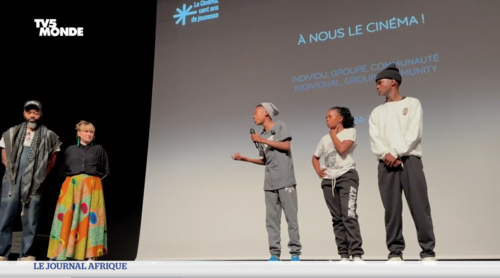 |
Afrique du Sud : "À nous le cinéma" fête ses 30 ans
TV5 Monde, 7 June 2025
Report on the South African CCAJ workshop, coordinated by Cinema TAKE, and on the 30th edition of the "À nous le cinéma" International Meetings at the Sorbonne Nouvelle in June 2025.
"Opening up to other cultures and worlds, that is an other goal of these International Meetings."
Joséphine Kloeckner
|
|
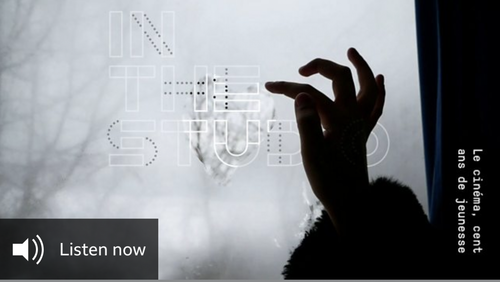
|
International Film School
BBC World Service - In The Studio, 24 December 2024
Podcast on Cinéma, cent ans de jeunesse made by Mark Reid, coordinator of CCAJ workshops in the United Kingdom, broadcast by BBC on 24th December 2024.
"Mark Reid reports on a ground-breaking scheme to teach pupils from all around the world how to make movies. And then gather to watch and comment on each other's work."
Mark Reid & Stephen Hughes
|
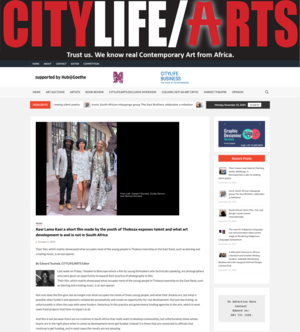 |
Kasi Lama Kasi, a short film made by the youth of Thokoza exposes talent and what art development is and is not in South Africa
City Life Arts, South Africa, October 2024
"Of Soul and Joy, has this time collaborated with a collective of seasoned filmmakers to expand the practice of these young photographers, who apart from learning photographic skills also teach them filming making skills and therefore extending in their practice, their oeuvre. The result of that is the short film audaciously titled Kasi Lama Kasi. And this is what happened: From September 2023 to May 2024, 15 young people from the Of Soul and Joy photography programme participated in several workshops with the film education organisation, CinemaTAKE, where they were mentored and taught filmmaking skills to ultimately provide a platform for creative expression, and foster positive community impact.
By the end of the workshops, these young people created “Kasi Lama Kasi” a documentary short film exploring the subject of filming the world, the self, and the other – a powerful angle especially in the context of their lived experiences in the township of Thokoza.
This film premiered in June 2024 at the prestigious Cinéma Cent Ans De Jeunesse (CCAJ) film festival in Lisbon, Portugal, where young filmmakers come together with cinema practitioners to exchange ideas and gain experience. Of Soul and Joy/CinemaTAKE were the first African representation that the CCAJ programme has had since its founding in 1995."
Edward Tsumele
|
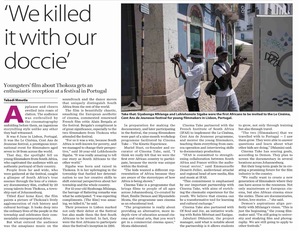 |
"We killed it with our doccie"
The Mail & Guardian, South Africa, July 2024
“It was 6 June in Lisbon, Portugal. It was the Le Cinéma, Cent Ans de Jeunesse festival, a prestigious international event for filmmakers aged seven to 18 from across the world. That day, the spotlight fell on young filmmakers from South Africa, who captivated the audience with an authentic portrayal of their country.
People from far and wide, who were gathered at the festival, caught a glimpse of South Africa’s true essence through the lens of a visionary documentary film, crafted by 20 young talents from Thokoza, a township east of Johannesburg.
[...] The film is beautifully chaotic, smashing the European aesthetic of cinema, commented renowned French film critic Alain Bergala at the festival. Bergala’s compliment is of great significance, especially to the two filmmakers from Thokoza who attended the festival.
“For us it was a win, because South Africa is well-known for poverty, and we managed to change their perspective,” said 16-year-old Lehlohonolo Sigaba. “It was really amazing to tell our story as South Africans to the other world.”
Tebadi Mmotla
|
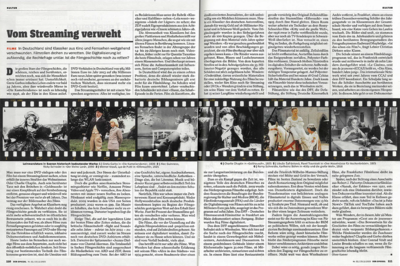 |
Gone with the streaming
Der Spiegel, Germany, December 2023
"...Yet it would be necessary to give young people in particular access to film history. Not far from the Wiesbaden archive, in Frankfurt, 10 pupils are sitting in the classroom of the Herder comprehensive school on a gloomy December morning, watching on the smartboard as a cat switches from walking to running. The images are ancient, dating back to the end of the 19th century and belonging to the famous motion studies by photography pioneer Eadweard Muybridge. "Is this already a movie?" teacher Christian Dirksen asks his class.
The school participates in a film education program that was developed in France and is now being implemented in more than ten countries. It is called "Le Cinema, cent ans de jeunesse" (CCAJ), "Cinema, cinema, a hundred years of youth". The international network has been coordinated by the CCAJ and the DFF for two years. Over the course of a school year, pupils watch excerpts from famous works, which they relate to each other, and work on their own film project. This year, the focus is on documentaries, with the Frankfurt film class shooting at the nearby zoo.
Later, after watching an excerpt from Robert J. Flaherty's classic 1922 documentary "Nanuk, der Eskimo" (Nanook of the North), a discussion ensues about the extent to which documentaries are staged. When the class learns that some of the film was shot in sets, one pupil shouts: "That's fake news!" TikTok and YouTube have also led to people no longer believing moving images.
Wim Wenders, who was involved as a mentor in this year's "Cent ans de jeunesse" program, warns: "Neglecting awareness of the history of film means many missed educational opportunities." Which film artists will continue to accompany viewers? Chaplin and Garbo are likely to remain immortal. But Conrad Veidt and Louise Brooks will only make it if the memory of the slowly fading film history remains alive."
Oliver Kaever
|
|
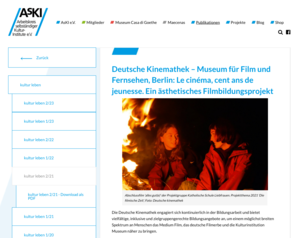
|
An aesthetic film education project
AsKI kultur leben, Germany, February 2021
"The educational approach [of CCAJ] deals with film as a historically evolved medium, as a reference to diverse cultures and artistic expressions. Essence of the project work is a yearly changing project-topic, which is defined formally and not narratively. Like this it allows the participants to deal with the esthetic potentials of film and subsequently use them to express themselves. Analysis and practice go hand in hand. [Thanks to an additional open teacher’s course at the Kinemathek in Berlin] the practical knowledge generated during the project-activities can be shared with and spread into the German education system in a sustainable way. "
Bettina Henzler and Jurek Sehrt
|
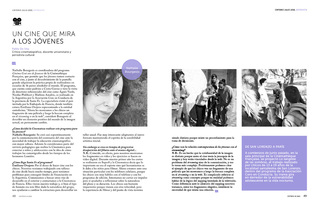 |
A cinema aimed at young people
Criterio, Argentina, July 2019
"It was very interesting for us to adapt to the structure proposed by this programme (of the CCAJ) while maintaining our own approach and sensibility." Emiliano Ovejero
Pablo de Vita
|
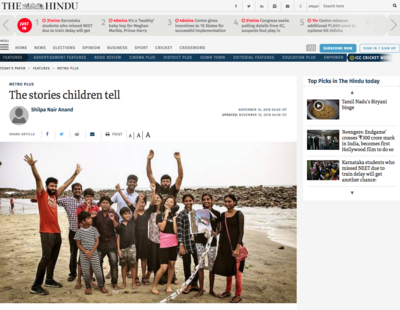 |
The stories children tell
Metro Plus, India, November 2018
“Associating with Cinémathèque has the added advantage of being able to upload the films on its CCAJ blog network, which will not only be viewed by an international group but also gives CFA access to their content. ”
Shilpa Nair Anand
|
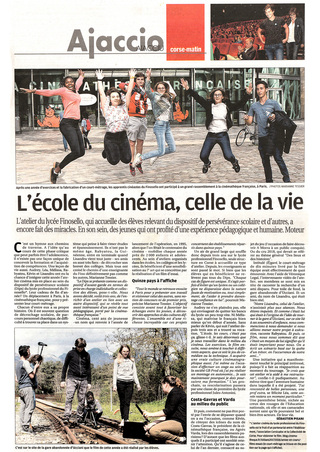 |
Life, the greatest cinema school of all
Corse-Matin, France, July 2018
“A hymn to the cross roads of life. In adolescence, that critical developmental phase, many paths to the learning and development of filmmaking skills have to be explored, as no one single approach works for everyone. […] Everyone has their own story to tell. There is often the issue of dropping out from school, difficult personal circumstance, the difficulty of finding a place in a system that struggles to marry academic study and personal and social development.”
Sébastien Pisani
|
|
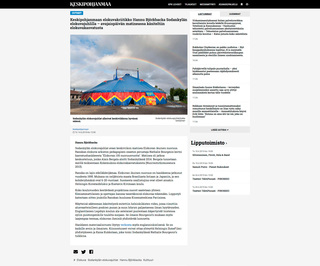 |
The opening of the Midnight Sun Film Festival, focused on Film Education
Keskipohjanmaa, Finlande, June 2018
“At the Climate screening, we saw a film from Helsinki, where a young woman undresses in the centre of the city, in the cold, while her cheeks and lips get redder and redder. Whereas the students of Legsby Primary School in England huddle up against each other on a park bench to protect themselves from the wind. This gives voice to a larger question, according to Nathalie Bourgeois, that of the underlying human nature that unites the characters in film.”
Hannu Björkbacka
|
|
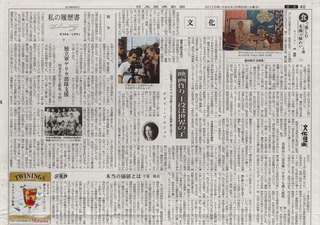 |
Cinematic creation, the children of the world play their first role
Nihon Keizai Shinbun, Japan, May 2018
“Why did this project come about? I think it’s because “we are all searching”. Teachers, film professionals and children use each other’s skills and experiences to meet the same goal. Everything starts with a hypothesis – a question of cinema. Adults and children together, are all searching for the solution. We don’t impose knowledge, we go on a learning journey together.”
|
|
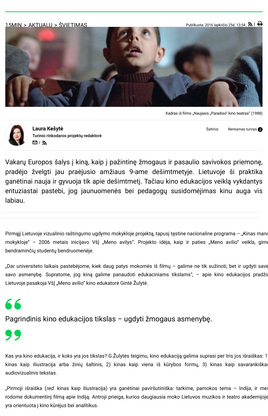 |
What influence does cinema have on young people?
15 min, Lithuania, November 2016
“Taking part in this project has allowed me to start to understand my feelings better, and, in creating the script, allowed me to talk with other people. The most beautiful thing is that we’ve learnt how to reflect a character’s inner life through filming the wind, the sun, a cloudy sky, or trickling water” according to Severina. “I’ve learnt that by filming meteorological features we can express different emotions, which can sometimes be difficult to express in real life. I’ve found that in making cinema to obtain results I have to surpass, or understand better what it is that I want,” says Paula of her discoveries. For Kristupas his studies in cinema have opened up new means of communication. “We live in Anykščiai, a small town, where we all know each other really well, but by creating a film we revealed something more of ourselves. I found a team and we wanted to make films together again and again. This project has changed my opinion on fiction filmmaking: I understand that every datil in shot is important, and I’m bringing that level of attention to my own life in every day.”
Laura Kešytė
|
|
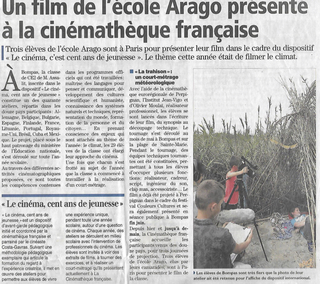 |
A film by Arago School at the Cinémathèque Française
L’Indépendant, France, June 2016
“Through the different cinematic activities proposed by the project, we’ve covered all the areas of our curriculum: mastery of language skills for thinking and communicating; science and the humanities, knowledge of natural and technical systems, representations of the world, the shaping of the person and the citizen.”
|
|
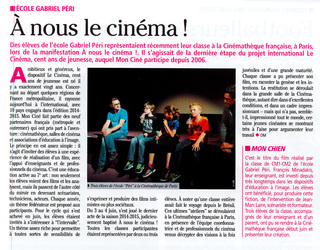 |
A nous le cinéma !
SMH n°385, France, July-August 2015
“Each year a central theme is offered to the participants. For the edition of the project that ended in June, students were invited to investigate the interval, a rich theme, which allowed all kinds of sensibilities to be expressed, and to produce more intimate films, or films more rooted in their societal context."
|
|
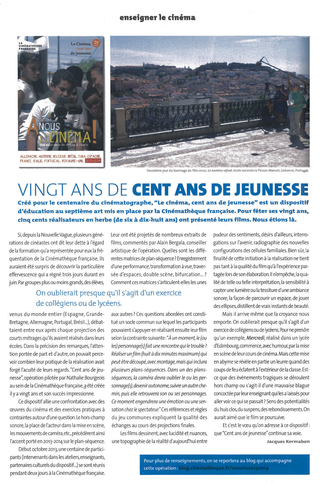 |
Twenty Years of CCAJ
Bref n°112, France, August 2014
“The films illustrate the layout of today’s reality with lucidity and nuance, expressing a modesty of feelings, a range of desires, with questions about the future and offer up an x-ray of the new configurations of the family unit. The fixed and final nature of the films themselves is in opposition to the shared process of ever changing creation in which they’re made. Regardless, the quality of this or that interpretation of the project, the sensitivity to capture a certain quality of light or the dynamic range of a sound, the way to survey a space, to play pauses and beats, distils real moments of beauty.”
Jacques Kermabon
|
|
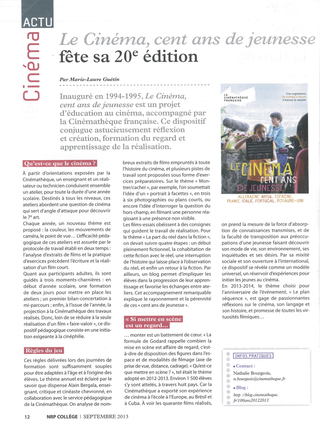 |
Cinema, Cent Ans de Jeunesse celebrates its 20th year
NRP Collège, France, September 2013
“To see the forty films made as part of this project is to participate in an understanding of the power of shared knowledge, and to recognise the abilities of young people to transpose their way of life, surroundings, worries and desires through the medium of cinema. By its openness to all and its international dimension, the project proves itself to be a universally applicable model, a great repository of experience to introduce young people to cinema.”
Marie-Laure Guétin
|
|
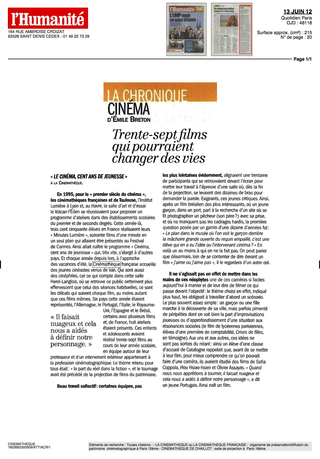 |
Thirty-Seven Films That Could Change Lives
L'Humanité, France, June 2012
“It wasn’t a question of putting a modern camera, which are so easy to operate these days, in the hands of a first-time filmmaker and asking them to film whatever happens to pass in front of them. The theme [the place of reality in fiction] forced them to start off by writing a screenplay. Most often it was a very simple theme, a boy or a girl explore their home town, frequently peppered with the random encounters of everyday life as it passed by the camera, showing universally recognisable social situations. The ideas in the films didn’t spring from nowhere, as if by magic. A student from a Catalan school recalled that before going out to make their films they watched films by Sophia Coppola, Hou Hsiao-hsien and Olivier Assayas for inspiration. Another student from Portugal identified that “When we were about to shoot it was cloudy, which helped us to define our character”. And thus, a film is born.”
Emile Breton
|
|
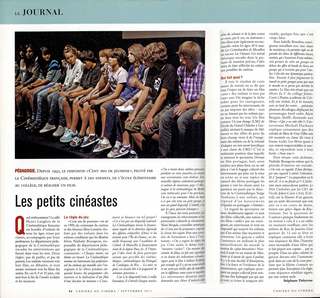 |
The Little Filmmakers
Cahiers du Cinéma, France, September 2011
“To see the results of this year’s work, we can clearly say that the challenge of this project is to make a film with the children and not on them. One can imagine the difficult task that the teachers and filmmakers face, of not imposing ideas whilst also keeping control of the reigns and not letting the children go off in every direction. […] The viewer’s gaze is therefore doubly sharpened: these are collective films created without a single author, and films ‘helped’ into being by a teacher and filmmaker, following a whole project which nourishes the children, who then return that same respect and momentum back to the project itself.”
Stéphane Delorme
|
|
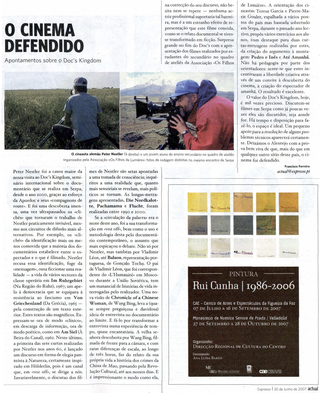 |
In defence of Cinema, notes on Doc’s Kingdom
Expresso, Portugual, June 2007
“At the end of the Doc’s Kingdom festival a great surprise was had with the presentation of a series of films by high school students who take part in the “Os Filhos de Lumière” workshops. [...] We feel that those responsible have encouraged creative freedom through their invitation to come and discover cinema through the project, creating the film lover of tomorrow. The resulting work is excellent […] We left Alentejo with living proof that, more than anywhere else, cinema has been defended.”
Francisco Ferreira
|
|